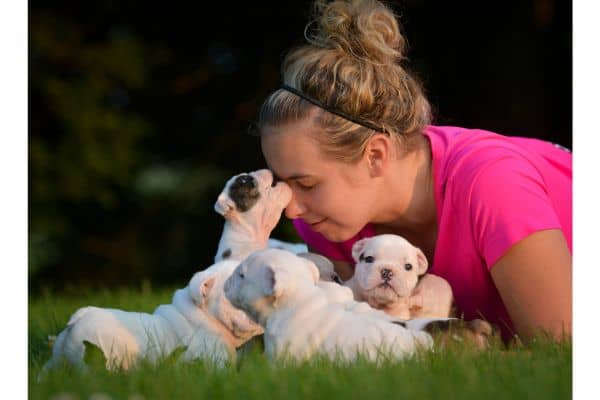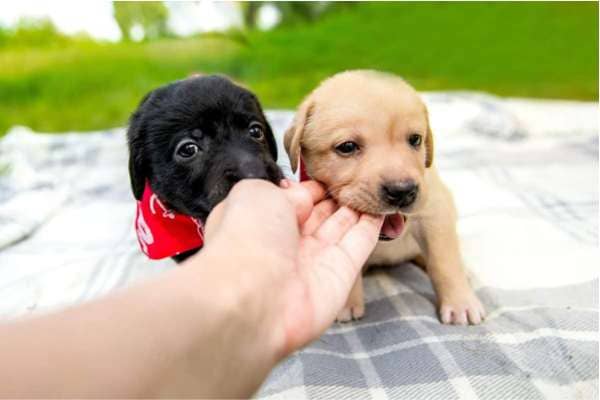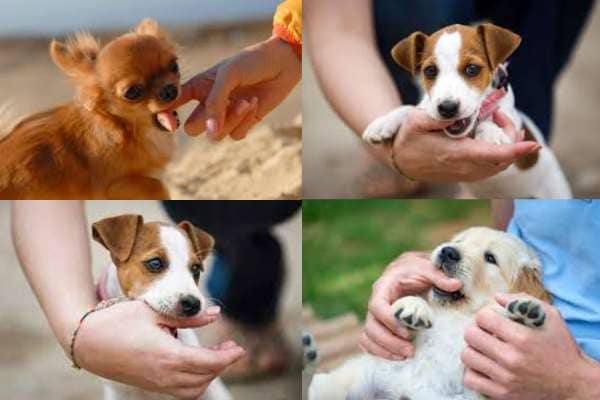Body Language Insights: Reading Your Dog’s Signals Why Does My Dog Nibble On Me
Dogs, our loyal and endearing companions, often engage in behaviors that may perplex their human counterparts. One such behavior is nibbling or mouthing on their owners. This seemingly playful act can range from gentle nips to more forceful bites, leaving many dog owners wondering about its underlying motivations.
Understanding the reasons behind this behavior is crucial for both the well-being of the dog and the establishment of a harmonious human-canine relationship.

In this article, we explore various explanations for why dogs engage in nibbling behaviors towards their owners. We begin by examining the natural instincts and puppy behavior that may drive them to mouth on objects, including humans.
Additionally, we delve into how affection and bonding play a role in this behavior, as well as how teething and exploration contribute to it during a dog’s early developmental stages. Furthermore, attention-seeking tendencies and training techniques are also considered as potential factors influencing this quirky canine conduct.
By shedding light on these motives, dog owners can gain insight into their furry friend’s actions and learn effective strategies to address or redirect such behaviors if necessary.
Key Takeaways
- Dogs may nibble on their owners due to natural instincts, teething, establishing dominance, or to show affection and bond with their owner.
- Providing appropriate chew toys during the teething process is important as it can help alleviate discomfort and provide sensory stimulation.
- Attention-seeking behaviors involving nibbling can be addressed through positive reinforcement training techniques, setting clear boundaries and consistent rules, and providing structure and routine.
- Encouraging gentle play and interaction, along with mental and physical stimulation, can help redirect the dog’s nibbling behavior.
Natural Instincts and Puppy Behavior
The natural instincts and behavior displayed by puppies often include nibbling on their owners as a means of exploration, teething, or establishing dominance within their social hierarchy.
It is instinctual for puppies to use their mouths to explore the world around them. Nibbling can be seen as a form of investigation and an attempt to understand their environment.
Additionally, puppies go through a teething process where they chew on objects to alleviate discomfort caused by emerging teeth. Nibbling on their owners may provide relief from this discomfort.
Furthermore, nibbling can also be a way for puppies to assert dominance within their socialization process. By nibbling on humans, they are attempting to establish themselves higher in the social hierarchy and demonstrate control over resources.
Overall, the act of nibbling serves various purposes for puppies in terms of instinctual behavior and the socialization process.
Affection and Bonding
Affection and bonding can be demonstrated by a dog through gentle mouthing or nibbling. This behavior is often seen in puppies as a way to explore their world and establish social connections. Playful interaction is an important aspect of affection and bonding, as dogs use their mouths to engage with their owners and show affection. Nibbling can also be a form of grooming behavior, where dogs nibble on their owners as a way to clean or groom them.
To enjoy this topic more, consider the following:
- Observe your dog’s body language during playful mouthing or nibbling.
- Understand that gentle mouthing is different from aggressive biting.
- Provide appropriate toys for your dog to chew on instead of your hands.
- Seek professional help if the nibbling becomes excessive or problematic.
By incorporating these suggestions into your interactions with your furry friend, you can further enhance the bond between you and your dog while promoting healthy playtime and grooming habits.
Teething and Exploration
Teething and exploration in dogs are important developmental stages characterized by heightened curiosity and a need to alleviate discomfort through chewing on objects. During teething, puppies experience discomfort in their gums as their baby teeth are replaced by adult teeth. Chewing helps to relieve this discomfort, providing them with temporary relief. Additionally, exploration is an essential part of a dog’s development as it allows them to learn about their environment and engage in sensory stimulation.
Table: Sensory Stimulation during Teething and Exploration
| Sensory Stimulation | Benefits |
|---|---|
| Texture | Helps develop strong jaw muscles |
| Taste | Provides variety and mental stimulation |
| Smell | Enhances the learning process |
| Sound | Engages auditory senses |
Understanding these natural behaviors can help dog owners provide appropriate outlets for their pets’ chewing needs while minimizing destructive behavior. Offering a variety of safe chew toys with different textures, tastes, smells, and sounds can provide both physical and mental stimulation during these crucial stages of development.
Attention-Seeking Behavior
Engaging in attention-seeking behavior can be a natural way for dogs to seek interaction and connection with their owners, evoking feelings of companionship and affection in the audience. This behavior may occur due to various reasons such as separation anxiety or dominance display.
Dogs experiencing separation anxiety may nibble on their owners as a means of seeking reassurance and closeness when they feel distressed by being left alone. Similarly, nibbling can also serve as a dominance display, especially if the dog perceives itself as the leader of the pack. By engaging in this behavior, dogs may be attempting to assert their authority over their owners.
It is important for dog owners to address these underlying issues through positive reinforcement training techniques and providing appropriate outlets for mental and physical stimulation to discourage attention-seeking behaviors that involve nibbling.
Training and Discipline
Conducting proper training and discipline for dogs is crucial in establishing a harmonious relationship between owners and their pets. Some may find it surprising that these methods can be ironically effective in curbing attention-seeking behaviors involving nibbling.
Positive reinforcement plays a significant role in training dogs to understand and follow boundaries. By rewarding desired behaviors with treats or praise, owners can reinforce the idea that gentle play and interaction are more desirable than nibbling.
Setting clear boundaries through consistent rules and commands helps establish a hierarchy within the human-dog relationship, reducing the need for attention-seeking behaviors such as nibbling. Dogs thrive on structure and routine, so providing them with consistent guidance allows them to feel secure and less inclined to engage in unwanted behaviors like nibbling on their owners or others.
See also:
How to Stop Puppies from Biting and Chewing
Bully Sticks: A Safe and Healthy Chew for Your Dog
Discover the Best Dog Bones for Hours of Chewing Fun and Dental Health
Frequently Asked Questions
How can I stop my dog from nibbling on me?
To address dog nibbling, a positive reinforcement approach in dog training can be effective. This method emphasizes rewarding desirable behaviors and redirecting unwanted ones. By focusing on teaching alternative behaviors, dogs can learn appropriate ways to interact with their owners.
Is nibbling a sign of aggression in dogs?
Nibbling is not typically a sign of aggression in dogs. Common reasons for dogs to nibble on their owners include playfulness, teething, or seeking attention. Differentiating between nibbling and biting behavior involves considering factors such as intensity and intent.
Should I be concerned if my dog nibbles on other people?
One should be concerned if a dog nibbles on other people as it may lead to unintended consequences or harm. To address this behavior, training techniques can be employed to teach dogs to stop nibbling.
Can excessive nibbling be harmful to my dog’s health?
Excessive nibbling in dogs may lead to potential dental issues, such as worn-down teeth. Proper socialization plays a crucial role in preventing this behavior. Understanding and addressing these concerns can serve dog owners in promoting their pet’s overall health and well-being.
Are there any benefits to my dog nibbling on me?
Dog behavior research has shown that nibbling on their owners can be a form of bonding for dogs. This behavior allows them to establish social connections and strengthen the bond between dogs and their human caregivers.


